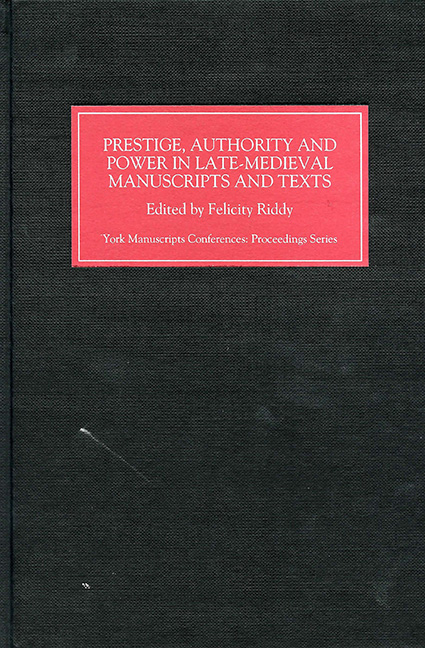Book contents
- Frontmatter
- Contents
- List of Plates
- Introduction
- Inventing Authority: Glossing, Literacy and the Classical Text
- Manuscripts of Nicholas Love's The Mirror of the Blessed Life of Jesus Christ and Wycliffite Notions of ‘Authority’
- The Patronage and Dating of Longleat House MS 24, a Prestige Copy of the Pupilla Oculi Illuminated by the Master of the Troilus Frontispiece
- Limner-Power: A Book Artist in England c. 1420
- A Poet's Contacts with the Great and the Good: Further Consideration of Thomas Hoccleve's Texts and Manuscripts
- The Politics of Book Ownership: The Hopton Family and Bodleian Library, Digby MS 185
- Piety, Politics and Persona: MS Harley MS 4012 and Anne Harling
- The Abbess of Malling's Gift Manuscript (1520)
- ‘Plutarch's’ Life of Agesilaus: A Recently Located New Year's Gift to Thomas Cromwell by Henry Parker, Lord Morley
- Manuscripts after Printing: Affinity, Dissent and Display in the Texts of Wyatt's Psalms
- Index of manuscripts
- Index of names and titles
- York Medieval Press: Publications
Manuscripts of Nicholas Love's The Mirror of the Blessed Life of Jesus Christ and Wycliffite Notions of ‘Authority’
Published online by Cambridge University Press: 24 October 2017
- Frontmatter
- Contents
- List of Plates
- Introduction
- Inventing Authority: Glossing, Literacy and the Classical Text
- Manuscripts of Nicholas Love's The Mirror of the Blessed Life of Jesus Christ and Wycliffite Notions of ‘Authority’
- The Patronage and Dating of Longleat House MS 24, a Prestige Copy of the Pupilla Oculi Illuminated by the Master of the Troilus Frontispiece
- Limner-Power: A Book Artist in England c. 1420
- A Poet's Contacts with the Great and the Good: Further Consideration of Thomas Hoccleve's Texts and Manuscripts
- The Politics of Book Ownership: The Hopton Family and Bodleian Library, Digby MS 185
- Piety, Politics and Persona: MS Harley MS 4012 and Anne Harling
- The Abbess of Malling's Gift Manuscript (1520)
- ‘Plutarch's’ Life of Agesilaus: A Recently Located New Year's Gift to Thomas Cromwell by Henry Parker, Lord Morley
- Manuscripts after Printing: Affinity, Dissent and Display in the Texts of Wyatt's Psalms
- Index of manuscripts
- Index of names and titles
- York Medieval Press: Publications
Summary
The Mirror of the Blessed Life of Jesus Christ was one of the most popular of late-medieval devotional and meditative texts. Written in the early fifteenth century by Nicholas Love, prior of Mount Grace Charterhouse in Yorkshire, the work is extant in forty-nine complete or near-complete manuscripts and is found in the form of fragments and extracts in another twelve. It therefore forms, along with the Wycliffite Bible, the Brut Chronicle and Walter Hilton's Scale of Perfection, one of the most widely disseminated works in Middle English prose. The Mirror was a free translation into the vernacular of a Franciscan text generally ascribed to St Bonaventura in the Middle Ages, the Meditationes vitae Christi. The Meditationes itself was one of the most protean and popular of Franciscan devotional works, extant in hundreds of Latin manuscripts and translated during the Middle Ages into almost every major European tongue.
Nicholas Love's translation was, however, endowed with a specially privileged status. It was licensed by Archbishop Thomas Arundel in 1410 as an implied alternative to the Lollard Bible, the reading of which had been restricted, and aimed, to quote his certificate of approval found attached to twenty copies of the text, ‘ad fidelium edificacionem, et hereticorum siue lollardorum confutacionem’ (‘at the edification of the faithful and the con- futation of heretics or Lollards’).
The Mirror engages with Lollardy on several planes. There are passages of doctrinal polemic combating Lollard views on confession, the Eucharist, the giving of tithes, the dependence or otherwise of priestly teaching on priestly morality. Such passages are accompanied in many copies by marginal notes ‘contra lollardos'. Love also adds a ‘Treatise on the Sacrament’ to the Meditationes, thereby emphasizing orthodox views on the nature of the Eucharist. More interestingly, however, the Mirror wages a hermeneutic war on Lollard approaches to the scriptural text. Much more subtly articulated than the anti-Lollard doctrinal propaganda, Love's conservative her-meneutics is nevertheless central to the Mirror's orthodox polemic. However, it is my contention that the Mirror is ultimately uneasy in its response to Lollardy, so that an overt rejection of Lollard assumptions and aims coexists with a complex and uncertain accommodation of certain primary hermeneutic emphases of the heresy.
- Type
- Chapter
- Information
- Publisher: Boydell & BrewerPrint publication year: 2000



